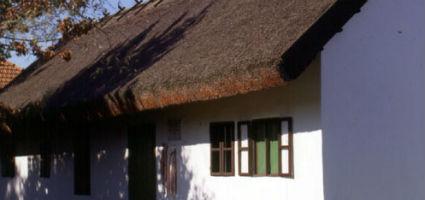2025. September 18. Thursday
Ferenc Móra Memorial House - Kiskunfélegyháza
 |
Address: 6100, Kiskunfélegyháza Móra Ferenc utca 19.
Phone number: (76) 461-468
E-mail: info@kiskunmuzeum.hu
Opening hours: 01.04-31.10.: Wed, Fri, Sat 9-13
01.11-31.03.:Mon-Fri only on prior notice |
Museum tickets, service costs:
|
Ticket for adults
|
600 HUF
|
|
|
Ticket for students
|
300 HUF
|
|
|
Ticket for pensioners
|
300 HUF
|
|
|
Combined ticket for adults
(valid for Kiskun Museum + Ferenc Móra Memorial House + Sándor Petőfi Memorial Hall)
|
2000 HUF
|
|
|
Combined ticket for students
(valid for Kiskun Museum + Ferenc Móra Memorial House + Sándor Petőfi Memorial Hall)
|
1000 HUF
|
|
|
Combined ticket for pensioners
(valid for Kiskun Museum + Ferenc Móra Memorial House + Sándor Petőfi Memorial Hall)
|
1000 HUF
|
|
|
Combined season ticket for a year for students
(valid for Kiskun Museum + Ferenc Móra Memorial House + Sándor Petőfi Memorial Hall)
|
1500 HUF
|
|
|
Combined season ticket for a year for pensioners
(valid for Kiskun Museum + Ferenc Móra Memorial House + Sándor Petőfi Memorial Hall)
|
1500 HUF
|
|
|
Guide
|
1000 HUF
|
|
|
Photography
|
1000 HUF
|
|
|
Video
|
1000 HUF
|
In the bigger room a literary historical exhibition demonstrates th elife-work of the poet. Ferenc Móra’s adherence to his town can be followed by means of a material emphasising the region historical aspect.
The kitchen (porch) recalls the free chimneyed kitchen of the writer’s mother. Utility and bread making tools are exhibited.
The third room demonstrates relics of the furrier occupation of the writer’s father, Márton Móra.
The kitchen (porch) recalls the free chimneyed kitchen of the writer’s mother. Utility and bread making tools are exhibited.
The third room demonstrates relics of the furrier occupation of the writer’s father, Márton Móra.
|
Related activities
|
||